The Grandaddy of Roleplaying Games!
What do you think of when someone says "Dungeons and Dragons"?
If it is a popular role-playing game, we're thinking of the same thing!
Dungeons and Dragons (D&D) is a fantasy role-playing game designed by Gary Gygax and Dave Arneson in 1974. Here, we have Dungeons and Dragons coloring pages free and downloadable inspired by the game.
Dungeons and Dragons is published by Wizards of the Coast, which is a subsidiary of Hasbro. Wizards of the Coast also publishes Magic: The Gathering, a more recent card game.
The first of many fantasy games, Dungeons and Dragons remains very popular. New editions are released every so often.
As of this writing, there have been five editions of Dungeons and Dragons. The most recent was released in 2014. However, there may be other ones out by the time you read this.
Dungeons and Dragons has been extremely popular since its introduction. This popularity shows no signs of flagging.
Literally tens of millions of people have played Dungeons and Dragons.
Players of Dungeons and Dragons sit around a tabletop and control a character.
A Dungeon Master (DM) controls the storyline. Among other things, the DM controls non-player characters that the players encounter.
Dungeons and Dragons characters encounter "monsters," which can be in various forms such as dragons or other animals.
The DM relies on rules - which are quite lengthy - contained in rulebooks. At present, there are three core rulebooks: The Player's Handbook, the Dungeon Master's Guide and the Monster Manual.
As you can probably tell, playing Dungeons and Dragons involves some study and time.
Each player creates a character according to, yes, some rules. The character has various attributes such as Strength, Constitution, Dexterity, Intelligence, Wisdom, and Charisma.
The character also has a race, such as an elf, an occupation such as a wizard or fighter, and so forth. Yes, there are a lot of rules about how the characters are formed.
When a Dungeons and Dragons character encounters an opponent, the player decides what their character will do. There are many choices, such as punching the opponent.
The DM decides what happens as a result of such encounters.
As you can probably tell, the DM really needs to know the rules contained in the rulebooks.
The characters change over time. They evolve into wealthier characters or into something else.
The characters change as a result of their encounters with the situations they encounter.
When a character does well in an encounter, he or she earns experience points (XP). When the character accumulates a sufficient number of XP, it can evolve into a stronger or wealthier or different type of character.
It is also possible for characters to die or be wounded. However, often the character can be resurrected in one way or another by using magic.
Characters engage in "adventures." This is a story established by the DM. There are standard adventures in Dungeons and Dragons that are called "modules," but the DM also can create a unique adventure.
Several adventures linked together constitute a campaign.
Campaigns are supplied by companies that publish them. There are many of them, including Eberron, Mystara, and Dragonlance.
The first Dungeons and Dragons games featured miniature figures. However, miniatures are no longer required, adventures are resolved by talking out the situation.
Dungeons and Dragons evolved out of wargames, which have been popular for hundreds of years. However, Dungeons and Dragons does not rely on, say, Civil War battles.
Wizards of the Coast acquired Dungeons and Dragons in 1997.
While Dungeons and Dragons is no longer considered controversial, for a long time it was. Some of the same complaints lodged against video games were made against Dungeons and Dragons decades earlier.
For instance, some people accused Dungeons and Dragons of immersing players in a fantasy world that was so absorbing that they had difficulty separating fantasy from reality. Some players reportedly experienced psychotic episodes from their over-involvement.
Even some murders were blamed on Dungeons and Dragons. However, the links to the games were never really proven.
There also have been accusations of Satanism and demon worship.
However, when looked at now, Dungeons and Dragons does not seem particularly scary and is a good way for friends to socialize.
Some famous people have been Dungeons and Dragons players, including Robin Williams and Vin Diesel.
Dungeons and Dragons escaped its infamy. It has been made into an animated television series, a film series, various magazines, novels, and video games.
There were yearly Dungeons and Dragons Championship Series from 1977 until 2013. The Series was revived in 2016 with some changes.
Dungeons and Dragons became a generic term for fantasy role-playing games. It has had a profound impact on subsequent games.
The game created the idea of a virtual reality for play which now is common in video games of all types.
There have been many Dungeons and Dragons comics. These include "Knights of the Dinner Table," a comic-sized magazine.
There have been three Dungeons and Dragons films: Dungeons & Dragons (2000), Dungeons & Dragons: Wrath of the Dragon God (2005), and Dungeons & Dragons: The Book of Vile Darkness (2012).
Dungeons and Dragons never disappeared. It remains as popular as ever, though often in different forms such as video games. It's a lot of fun and led to a lot of vivid artwork.
2019








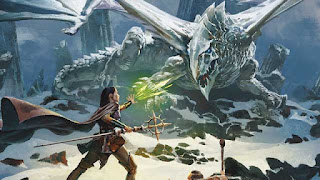

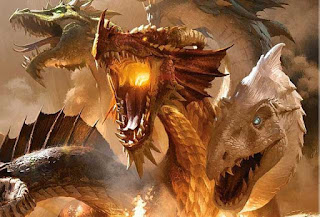



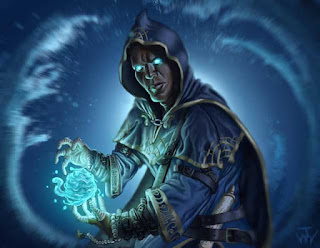


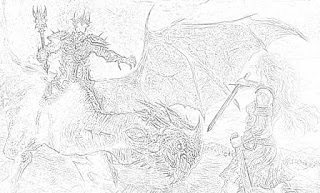




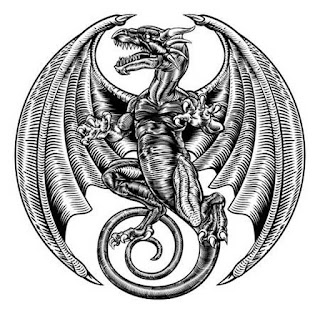







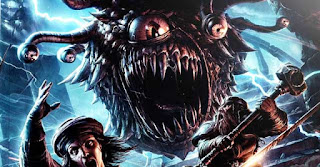



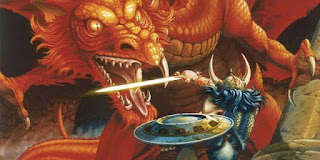







No comments:
Post a Comment